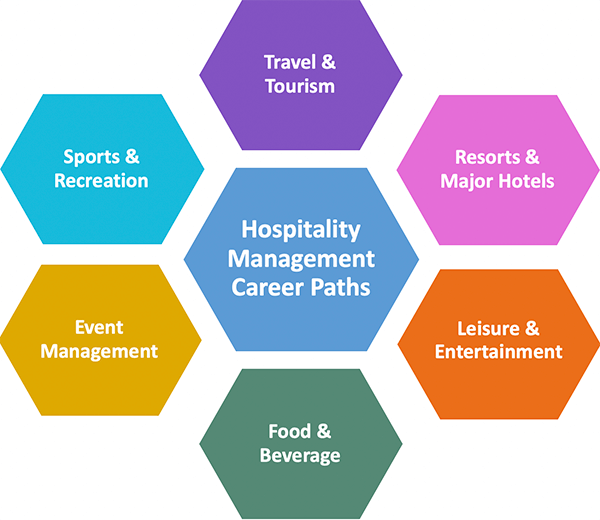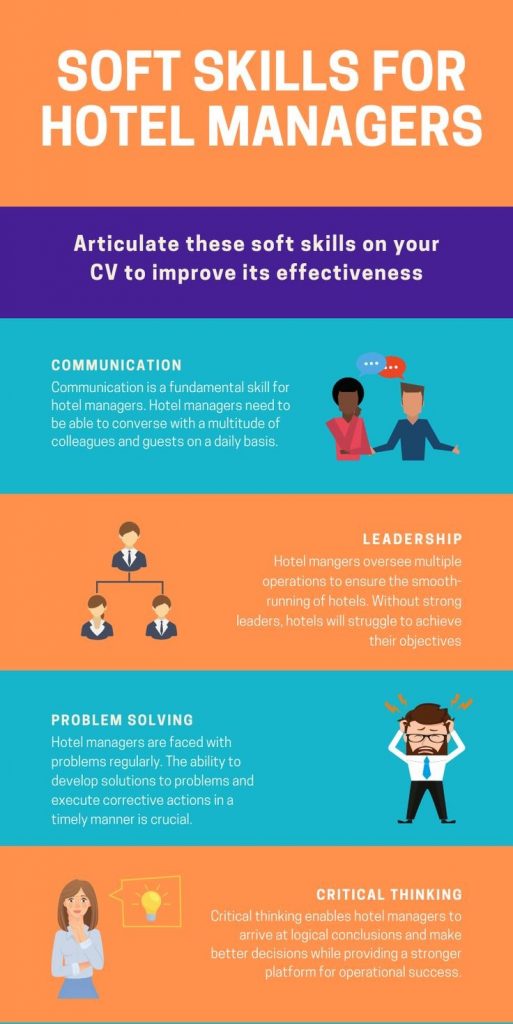Engineering has always been a field of innovation and evolution, offering exciting opportunities for those who choose it as a career path. As a fresh graduate or a college student,…

What Is Hotel Management? – Definition, Skills, Job Roles For Freshers
The hospitality industry thrives on providing exceptional experiences for travelers, and at the heart of this lies hotel management. It’s a multifaceted field encompassing everything from overseeing daily operations to strategically steering a hotel toward success.
In this comprehensive guide, we’ll delve into the world of hotel management, exploring its core aspects, career paths, and the skills required to excel in this dynamic field.
What is Hotel Management?
Hotel management is the comprehensive oversight of operations within a hotel or hospitality establishment. It involves ensuring that guests have an exceptional experience, while also managing the day-to-day activities that keep the hotel running smoothly. This includes overseeing departments such as the front office, housekeeping, food and beverage, maintenance, and security.
Effective hotel management requires a blend of strategic planning, financial acumen, and interpersonal skills. Managers must balance the needs of guests with the operational goals of the hotel, ensuring profitability and efficiency.
What Does a Hotelier Do?
A hotelier, or hotel manager, is responsible for the overall operation of a hotel. Their duties span a wide range of tasks, which can be categorized into several key areas:
Guest Services
Ensuring guests have a memorable experience is paramount. This involves:
- Greeting and checking in guests.
- Handling guest complaints and requests.
- Providing information about local attractions and services.
Operations Management

Overseeing the daily operations to ensure everything runs smoothly:
- Coordinating between different departments (housekeeping, front desk, maintenance).
- Ensuring rooms are clean and well-maintained.
- Managing inventory and supplies.
Financial Management
Ensuring the financial health of the hotel:
- Setting room rates and managing revenue strategies.
- Budgeting and financial planning.
- Controlling costs and maximizing profitability.
Staff Management
Leading and motivating hotel staff:
- Hiring, training, and evaluating employees.
- Scheduling shifts and managing workload.
- Fostering a positive work environment.
Marketing and Sales
Promoting the hotel to attract guests:
- Developing marketing strategies and campaigns.
- Managing online presence and reputation.
- Coordinating with travel agents and event planners.
Why Build a Career in Hotel Management? – Freshers Perspective
Building a career in hotel management can be an excellent choice for freshers for several compelling reasons:
- Diverse Career Opportunities: Hotel management offers a wide range of career paths for freshers. Freshers can explore various roles such as front office management, housekeeping, food and beverage services, event planning, sales and marketing, and human resources. This diversity allows individuals to find a niche that best suits their skills and interests.
- Global Career Prospects: The hospitality industry is a global one, meaning that skills in hotel management are transferable across countries. This can open doors to international job opportunities, allowing freshers to experience different cultures and working environments.
- Fast Career Growth: The hotel industry often promotes from within and values practical experience. Freshers who start in entry-level positions can quickly move up the ranks to supervisory or managerial roles. Performance and dedication can lead to rapid career advancement.
- Dynamic and Exciting Work Environment: Hotel management jobs are known for their dynamic nature. Every day can bring new challenges and opportunities, from dealing with different guests to managing events. This variety can make for an exciting and engaging career.
- Development of Transferable Skills: A career in hotel management helps develop a broad set of transferable skills such as customer service, communication, problem-solving, leadership, and teamwork. These skills are valuable in many other industries, providing flexibility in career choices.
- Attractive Perks and Benefits: Working in the hotel industry often comes with attractive benefits such as discounted or free stays at hotels, meal allowances, and opportunities to meet people from around the world. These perks can enhance both professional and personal life.
- Educational Opportunities: Many hotel chains and hospitality companies offer training and development programs to their employees. Freshers can benefit from continuous learning opportunities, certifications, and even sponsorships for advanced studies.
- Economic Resilience: While economic downturns can impact the hospitality industry, it generally remains a robust sector due to the consistent demand for travel and tourism. This resilience provides a relatively stable career path.
- Creative and Innovative Environment: The hotel industry encourages creativity and innovation, whether in designing guest experiences, marketing strategies, or operational efficiencies. Freshers with creative mindsets can thrive in such an environment.
- Networking Opportunities: Hotel management provides ample opportunities to network with professionals from various industries, including travel, tourism, and corporate sectors. These connections can be valuable for career growth and professional development.
In summary, a career in hotel management offers freshers a dynamic, diverse, and rewarding career path with numerous opportunities for growth, development, and global exploration. The skills and experiences gained in this industry are highly valued and can lead to various career possibilities.
Pros and Cons of a Career in Hotel Management
Like any career, hotel management has its pros and cons. Understanding these can help you decide if this is the right path for you.
| Pros of a Career in Hotel Management | Cons of a Career in Hotel Management |
|---|---|
| Job Diversity: With various departments and roles, there are always new tasks and responsibilities. | Irregular Hours: Hotels operate 24/7, which can mean long, irregular, and sometimes unpredictable working hours. |
| Career Progression: Opportunities for advancement can be rapid for those who excel. | High Stress: Managing guest satisfaction and dealing with unexpected issues can be stressful. |
| Networking: You get to meet people from all over the world, which can be both enriching and beneficial for future career opportunities. | Physical Demands: The job can be physically demanding, requiring long hours on your feet and multitasking. |
| Travel Opportunities: Many hotel chains offer transfer opportunities across different locations. | Seasonal Variability: Depending on the location, there can be significant fluctuations in business volume throughout the year. |
| Rewarding Experience: Providing excellent service and creating memorable experiences for guests can be very fulfilling. | Pressure to Perform: The competitive nature of the hospitality industry can place constant pressure to maintain high standards. |
Qualifications Required for Hotel Management Career
To pursue a career in hotel management, certain educational qualifications and skills are typically required:
- Educational Background: A bachelor’s degree in hotel management, hospitality management, or a related field is often preferred. Some positions may accept an associate degree or a diploma in hospitality management.
- Certification: Professional certifications, such as the Certified Hotel Administrator (CHA) or the Certified Hospitality Supervisor (CHS), can enhance your credentials.
- Internships and Practical Experience: Hands-on experience through internships or part-time jobs in the hospitality industry is highly valued.
- Advanced Degrees: For higher-level management positions, an MBA with a focus on hospitality management can be beneficial.
- Skills Training: Courses in areas like customer service, financial management, marketing, and human resources are advantageous.
Job Roles in Hotel Management
Hotel management encompasses a variety of roles, each with its own set of responsibilities. Here are some of the key positions:
- General Manager: Oversees all aspects of hotel operations, ensuring high standards and profitability.
- Front Office Manager: Manages the front desk staff, reservations, and guest services.
- Food and Beverage Manager: Oversees the restaurants, bars, and other food service areas within the hotel.
- Housekeeping Manager: Ensures that guest rooms and public areas are clean and well-maintained.
- Sales and Marketing Manager: Develop strategies to attract guests and promote the hotel.
- Event Manager: Plans and coordinates events, such as conferences, weddings, and meetings.
- Human Resources Manager: Manages recruitment, training, and employee relations.
- Revenue Manager: Analyzes financial data to maximize hotel revenue through pricing strategies and occupancy management.
Hotel Management Skills
To excel in hotel management, a combination of hard and soft skills is essential:

- Customer Service: Providing exceptional service to guests is crucial. This includes handling complaints, providing information, and ensuring a pleasant experience.
- Leadership: Managing and motivating staff, as well as making important decisions, requires strong leadership skills.
- Communication: Effective communication skills with guests, staff, and other stakeholders are vital.
- Financial Acumen: Understanding budgets, financial reports, and revenue management is essential for maintaining profitability.
- Problem-Solving: The ability to quickly and effectively address issues as they arise.
- Attention to Detail: Ensuring that every aspect of the guest experience is flawless requires meticulous attention to detail.
- Flexibility and Adaptability: The hospitality industry is dynamic, and the ability to adapt to changing circumstances is important.
- Technical Skills: Familiarity with hotel management software and other technological tools used in the industry.
Hotel management is a dynamic and rewarding career that offers many opportunities for freshers passionate about hospitality and service. It requires a combination of education, experience, and a diverse skill set to succeed. Despite its challenges, a career in hotel management can be highly fulfilling, providing opportunities to work in a vibrant industry and make a significant impact on guests’ experiences.
Whether you are just starting out or looking to advance your career, the hospitality industry offers a promising path for personal and professional growth.
FAQs on Hotel Management For Freshers
Is hotel management a good career for freshers?
Yes, hotel management offers a dynamic career path with growth opportunities, good salaries, and a chance to meet people from around the world.
What skills are required for a hotel management fresher?
Communication, teamwork, problem-solving, adaptability, and a strong work ethic are crucial for freshers in hotel management.
How to get a job in hotel management as a fresher?
Start by building your resume with relevant skills and experiences (internships, volunteering). Research hotels and tailor your application to each position.
What are the career paths in hotel management for freshers?
Entry-level roles include guest services, housekeeping, food and beverage service, or front office positions.
Does a hotel management degree guarantee a job?
A degree strengthens your resume, but relevant experience and strong soft and hard skills are equally important for landing a job.
Are there any specific personality traits for hotel management?
Being patient, empathetic, detail-oriented, and having a positive attitude are valuable assets in this people-centric industry.
What are some challenges freshers face in hotel management?
Long hours, unpredictable schedules, and adapting to a fast-paced environment can be initial challenges.
How can freshers prepare for a hotel management interview?
Research the hotel, dress professionally, practice common interview questions, and showcase your passion for hospitality.
Latest Posts
Top Skills in Resume For Freshers – 2026 Detailed Guide
Creating a compelling resume as a fresh graduate can be a daunting task, but it’s also your ticket to landing your dream job. One of the key elements that can…
Step-by-Step Guide: How to Become a Mechanical Engineer
Mechanical engineering stands as one of the most versatile and in-demand engineering disciplines globally, offering exciting career opportunities across diverse industries. For college students and recent graduates in India, understanding…
What is Upskilling? – Meaning, Benefits and Tips to Upskill
Being ahead of the curve is more crucial than ever in the ever-changing world of today. This requires ongoing skill development and technological adaptation. This entails upskilling or reskilling for…
Top 10 Do’s and Don’ts For Your First Job
Looking for a new job can be a daunting task, especially if you’re a fresher. There are so many factors to consider, from the type of job you want to…
Popular Posts
Best CV Formats for Freshers: Simple, Professional & Job-Winning Templates
Creating an effective CV (Curriculum Vitae) is the first step towards landing your dream job or internship as a fresh graduate. Your CV is your initial introduction to potential employers…
100+ Quantitative Aptitude Questions for Placement with Answers
Quantitative aptitude questions play a crucial role in campus placements, competitive exams, and entry-level job interviews. Whether you are preparing for your first job interview, an aptitude test for placement,…
How to Start an AI Career in India: Skills and Future of Work
Artificial Intelligence (AI) is revolutionizing industries worldwide. From automating routine tasks to enabling self-driving cars and intelligent healthcare diagnostics, AI is reshaping the future of work. For college students and…
How to Write Mail for Job Application – Explained
A job application email is a professional email that you send to a potential employer to express your interest in a job opening. It is typically accompanied by your resume…
How to Write a Job Application Letter (With Samples)
When it comes to applying for your first job, making a great first impression is crucial. As a recent graduate, you might feel a little intimidated by the idea of…
